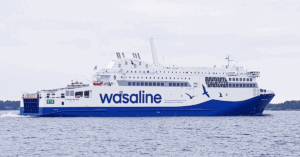Wasaline Launches First Carbon Neutral Shipping Route On The Baltic Sea
The Baltic Sea now has its first fully carbon neutral international shipping route, as Finnish ferry operator Wasaline switches entirely to renewable liquefied biogas (bio-LNG) for its Vaasa–Umeå service. The change means that Aurora Botnia, the vessel operating the route, will no longer use any fossil fuels.
This transition is the result of an agreement between Nordic energy company Gasum and Wasaline for the exclusive supply of bio-LNG, along with Wasaline’s decision to join a FuelEU Maritime pooling arrangement with Stena Line.
The pooling agreement makes it possible for Wasaline to generate FuelEU Maritime compliance for Stena Line. The arrangement enables Wasaline to operate fully on fossil-free fuel. The Vaasa–Umeå connection is now recognized as the first international green shipping corridor in operation, with the milestone supported by the DNV-led Nordic Roadmap initiative.
Wasaline’s original climate goal was to achieve carbon neutrality by 2030, but the target has now been reached already. The company has confirmed that all cargo and passenger transport on the route is carbon neutral with no extra cost to customers.
Aurora Botnia is equipped with battery systems and earlier this year an extension project for an additional 10.4 MWh battery capacity was announced. After the upgrade is completed in January 2026, in cooperation with Foreship, AYK Energy, and Wärtsilä, the vessel will have a total battery capacity of 12.6 MWh, the largest on any ROPAX ferry.
Wasaline’s managing director Peter Ståhlberg has said that while some shipping companies are seeking exemptions from new EU emissions regulations, Wasaline has focused on opportunities to reduce greenhouse gas emissions and environmental impact.
DNV’s Segment Director for RoRo and Ferries, Vegar Rype, stated that the Vaasa–Umeå route’s recognition as the first international green shipping corridor directly supports the goals of the Clydebank Declaration and the Ministerial Declaration on zero-emission shipping routes between Nordic countries.
Stena Line’s CEO, Niclas Mårtensson, said that by adding Aurora Botnia to its FuelEU Maritime pool, the company gains access to biogas that was previously unavailable to Stena Line. This, he explained, helps to reduce emissions for the whole pool, cut fuel costs, and strengthen their position as biofuels become more limited under stricter regulations.
Gasum’s bio-LNG is produced from waste materials such as biowaste, manure, sewage sludge, and other industrial and agricultural side streams. The fuel is fully renewable and, according to Gasum, its life-cycle greenhouse gas emissions are on average 90% lower compared with fossil fuels. LNG and bio-LNG are fully interchangeable and can be mixed in any ratio, making it possible for any LNG-powered vessel to use the renewable fuel without modifications.
Reference: gasum

